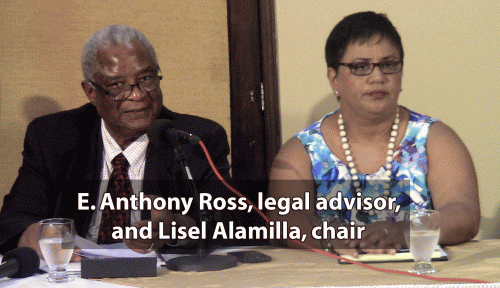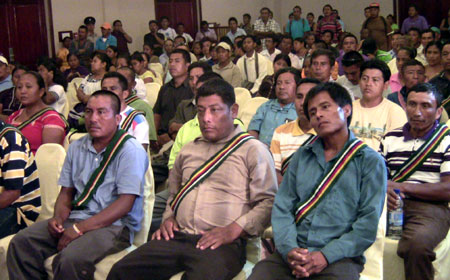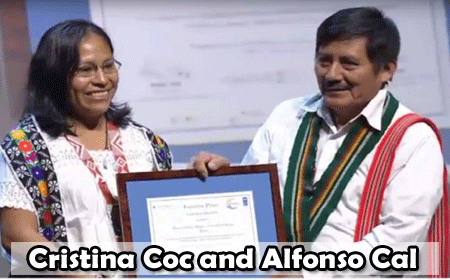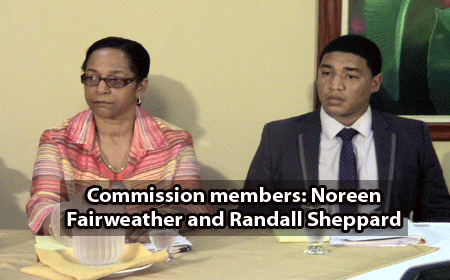BELIZE CITY, Fri. Jan. 15, 2016–The Toledo Maya Land Rights Commission, which was set up by the Government of Belize this week, was formally introduced to the media at a press conference convened at the Radisson Fort George Hotel on Friday morning.
The Commission says that it will begin the process of adopting the affirmation measures set out in an order of the Caribbean Court of Justice (CCJ) on April 22, 2015, but added that they cannot presume to set timelines and guidelines, because they will first have to consult with the Toledo Maya before deciding how the work will proceed.
The Government has engaged the services of E. Anthony Ross, QC, a Caribbean lawman based in Canada, as an expert in indigenous law.
Ross told the media that he hopes that an atmosphere of cooperation and mutual respect, rather than confrontation, would prevail as the parties work towards putting the CCJ order into effect.
“The adversarial process is over. There was a lawsuit. There were claims. And there is now a court order,” Ross emphasized.
He added that, “This is going to require cooperation between the Government and the Maya.”
In November 2015, the parties appeared before the Caribbean Court of Justice, after the Toledo Maya complained that nothing had been done since the consent order was handed down in April 2015. The Government then gave an undertaking to report back to the CCJ by January 21, 2016 on progress it has made in implementing the consent order, and the court said that it would hold the government to that undertaking.
(The CCJ had originally set a deadline of April 30, 2016 for the parties to report back to the court.)
On Tuesday, January 12, nine days ahead of the new deadline, the Government announced that the commission had been set up to implement the CCJ order.
Chairman of the Commission, former Cabinet minister and senator, Lisel Alamilla, told us that the Government will report back to the CCJ next week on progress made to date.
According to Alamilla, the Commission has not yet designed the consultation process, but she said “it is going to be inclusive of all persons that are interested in participating in these issues and all ethnic groups who are interested in it. This is going to have impact nationally…”

“The adversarial process is over:” Ross
The Commission, which takes the stance that “everything has to be resolved under the Constitution of Belize,” acknowledged that there are competing interests in Toledo among the various ethnic groups.
After the CCJ order of 2015, there was controversy in the Maya village in Santa Cruz over the ejection of Rupert Miles, a Creole Belizean, from that village. However, the Maya leaders accused Myles of behaving lawlessly and of desecrating a sacred site. The matter is now before the courts, with some villagers and Maya leaders, including the village alcalde and Maya activists, facing charges for the manner in which Myles was arrested by local authorities.

“Mr. Myles’ case is an incident that created a lot of buzz, and dialogue and concerns about how other ethnic groups co-exist with the Maya in Toledo and I am sure that will come up as part of the process, of dialogue but we don’t want to be distracted by that…” Alamilla said.
When the CCJ handed down the April 2015 consent order, a group of Maya who oppose communal ownership protested before the Supreme Court, insisting that they should be allowed to own separate parcels of land with individual titles.
Speaking with the media at today’s press conference, former lands commissioner, Noreen Fairweather, who also sits on the Toledo Maya Land Rights Commission, underscored that, “Both individual and collective rights exist today – and have always existed and will continue to exist, and the consent order actually speaks to that. It refers to looking at the individual and collective rights.”

The land dispute between the Maya and the Government has also challenged the manner in which the Government has issued logging concessions and petroleum exploration contracts to third parties. The Government has taken the stance that ownership of resources, such as oil, is by law vested in the Government and people of Belize.
Today, Ross said that a mechanism must be put in place to handle situations that would involve necessary encroachment upon the lands of the Maya.
Ross said that, “…where there is conflict between the private rights as set out in the order and the public good, it is my experience that the public good will always trump the private rights.”
According to the CCJ’s October 2015 decision, “As the Consent Order clearly recognizes in paragraph 5, the constitutional authority of the Government of Belize over all lands in Belize is not affected by that order and, we would add, by this award.”
In October 2015, the CCJ awarded $300,000 in reparations for the Toledo Maya—not to be issued as cash in hand to the claimants but to finance work to give effect to the CCJ order.
Alamilla said that the $300,000 awarded by the CCJ is seed money, but the undertaking, she said, will be costly and more money than the amount ordered by the court would be invested.

